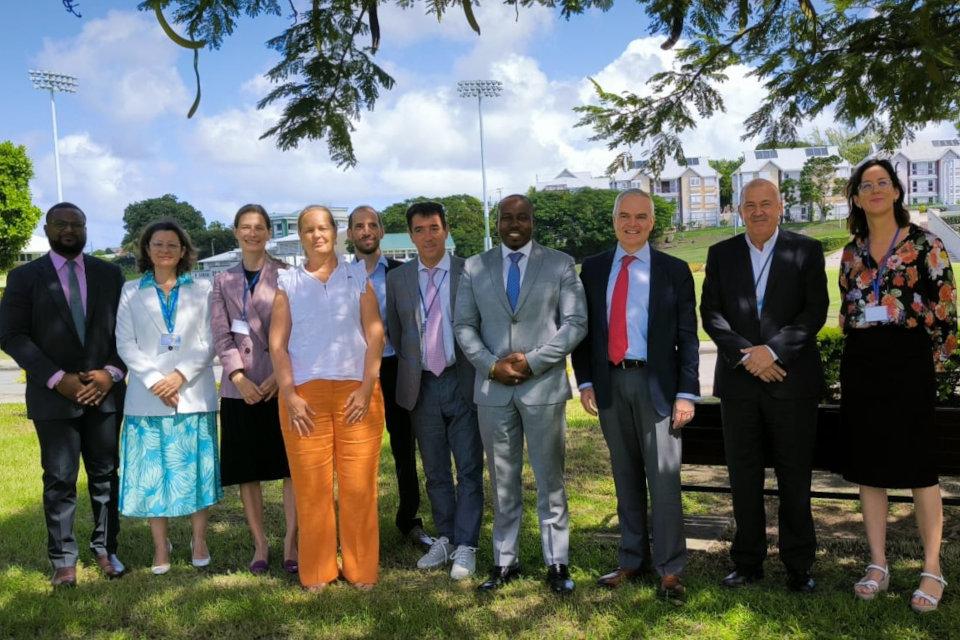
The workshop gathered 35 stakeholders onsite and some 40 experts online from both regions to discuss on the opportunities, needs and gaps in marine research and cooperation for the Caribbean region and successfully initiated a sustainable dialogue on marine research between the EU and the Caribbean region.
The workshop was inaugurated by the Barbadian Minister of Industry, Innovation, Science and Technology, the Hon. Davidson I. Ishmael who welcomed this joint collaborative initiative to address the opportunities and challenges in our oceans and thanked the European Union for its commitment to provide relevant assistance to the Caribbean region.
In her welcome message, Ms Maria Cristina Russo, Director for Global Approach and International Cooperation in R&I at the European Commission, stressed that the event aims to foster EU-Caribbean and research cooperation and thus stimulate the participation of the Caribbean research actors in the Horizon Europe research and innovation programme and other EU-related programmes for marine cooperation.
Following an overview on regional research priorities and capacity building needs and a presentation of relevant ongoing initiatives, the authors of the “EU-Caribbean study on marine scientific cooperation”, to be published in December 2023, presented the outcomes and recommendations of their analyses. Core of the event was the discussion on four key topics to address the regional marine challenges and to develop answers, which are briefly described below.
Under the topic ”Community resilience and climate change” the importance of community- led initiatives and programmes and a bottom-up strategy as well as knowledge and capacity building and long-term funding were stressed. The experts recommended to foster collaboration between scientists, communities and governments, to empower indigenous groups and to promote EU-Caribbean exchange programmes in order to follow up on what was learned and to provide support.
In the discussion on “Healthy ecosystems for SDG 14” the opportunities for cooperation were reflected, e.g. the establishment of regional research agendas, partnerships with regional and national organisations (funding agencies, academics), the development of regional platforms and databases, transboundary cooperation as well as regional and international conferences for information sharing and establishing international networks. The experts recommended to first compile the findings from a survey on EU-Caribbean marine cooperation, which was set up in the frame of the above-mentioned study on marine research, as they may help define the next steps towards marine research cooperation.
Another discussion offered Marine Spatial Planning (MSP) as a tool to respond to the topic “Fostering societal reliance on oceans”. The experts proposed to map and collect data from all sectors and discussed how the EU could potentially support the MSP process. They agreed that the Organisation of Eastern Caribbean States (OECS) is in a good position to advance sub-regional discussions. Participants further suggested the added value of an annual Caribbean Blue Economy Stakeholder Conference (CSC), where different actors will gather to exchange best practices and will foster the creation of partnerships for future collaborations.
Under the approach to the topic “Ocean observation for governance” a key research topic was outlined: “Improve the region's capacity to understand and foresee seismic, weather, climate and biological risks by raising the efficiency and quality data collection, integration and analysis for enhancing ocean governance.” The experts suggested to invest in capacity building and training programmes in key areas and proposed a research strategy in European and Caribbean collaboration in the field of ocean observation for governance.
The 2nd day of the workshop was dedicated to a detailed presentation on the European strategy for research and innovation and the funding opportunities under the Horizon Europe programme, and on regional funding mechanisms for research and capacity building in the Caribbean.
It was clear at the end of the workshop the complete alignment between the four key topics mentioned above and the EU Mission Restore Our Ocean and Waters by 2023 as well as the All-Atlantic Ocean Research and Innovation Alliance Declaration. The participants were committed to further explore potential synergies and develop ideas for EU-Caribbean joint actions in the near future.
The outcomes of this workshop will feed into the agenda of the upcoming high-level meeting of the EU-CELAC Joint Initiative on Research and Innovation that will take place on 28-29 November 2023 in Brussels.
More information
Details
- Publication date
- 22 November 2023
- Author
- Directorate-General for Research and Innovation
